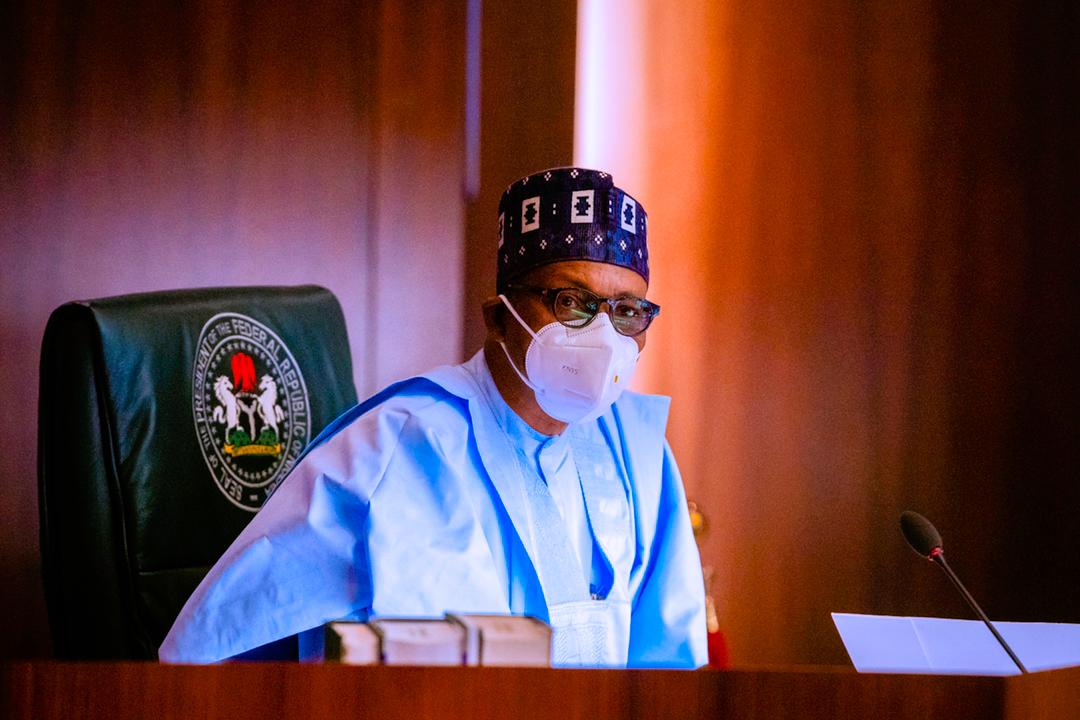Jail term for COVID-19 protocol violators
Recently, President Muhammadu Buhari signed into law the “COVID-19 Health Protection Regulations Act” to check the spread of the virus. The law provides legal backing for the wearing of facemasks, handwashing, regulation of public gatherings in enclosed spaces and social distancing to curb the transmission of the novel coronavirus. Most notably, it provides for a […]

President Muhammadu Buhari
Photo by Tolani Alli
Recently, President Muhammadu Buhari signed into law the “COVID-19 Health Protection Regulations Act” to check the spread of the virus.
The law provides legal backing for the wearing of facemasks, handwashing, regulation of public gatherings in enclosed spaces and social distancing to curb the transmission of the novel coronavirus. Most notably, it provides for a penalty of fine or jail term for violators of the COVID-19 protocols.
- COVID-19 vaccine procurement at advanced stage-FG
- Buhari, King Mohammed discuss Nigeria-Morocco gas pipeline, fertilizer plant
Whereas it is vital, especially in a time of a global emergency such as this, for the government to take tougher measures to safeguard public health, it is even more vital that the new law does not provide an avenue for officials to harass, intimidate and exploit people going about their lawful businesses.
For the law to have any kind of meaning to the populace, it is important for there to be enough sensitisation and awareness to inform and educate people about the required protocols and the attendant laws.
It is fundamental to note that the intent of the law is not to collect as many Nigerians as possible and throw them in jail, especially during the critical second wave of the pandemic, but to prevent as many people as possible from contracting the virus.
In that regards, law enforcement officers must not deliberately set traps for unwitting Nigerians to fall into, but ensure they are informed enough about the protocols and the consequences, including the provisions of the law.
To achieve this, the law enforcers must themselves be adequately educated on the new laws, its provisions and how to carry out their duties without compromising public health or the fundamental rights of Nigerians.
Whereas ignorance is not an excuse, as is argued in law, it should be noted that knowledge is power and an informed populace is more likely to be law-abiding and responsible.
In this regard, therefore, the government, through its public enlightenment agencies, needs to inform the public about the new regulations, especially as it concerns the second part of the law, which deals with operations of public places like open markets, malls, supermarkets, shops, restaurants, hotels, event centres, motor parks and fitness centres etc.
Secondly, for the law to serve as a deterrent, notable examples must be made to demonstrate that the government means business.
The conviction of a dozen private citizens scrounging for their daily bread will not have the same gravity as that of a senior public official, celebrity or notable personality.
Also, the government and its officials must be sincere in dealing with sensitive customers such as religious centres and places of worship.
Already, the law has made an exception for such places, by allowing them to accommodate more than the 50 persons stipulated for other public places and to accommodate as much as 50 per cent of the capacity of such spaces.
This provision could be exploited by places of worship and so it is important for the government to work with faith leaders to ensure compliance with these laws and to take decisive actions where necessary.
The laws are essential and good for the public wellbeing, but they must not be allowed, through habitual casualness, to become tools for the violation of the health protocols they seek to enforce.
At the same time, the government and its agencies must be responsible for not organising huge events that bring thousands of desperate Nigerians together as we have seen at NIMC offices nationwide.
For the benefit of all, the government and the people must work together to make this law work and ensure the collective public health of all citizens. A healthy nation is a wealthy nation.
